Updated October 25, 2023
When flying home from Istanbul, one of my travelling companions decided to shrink-wrap her newly purchased bag. It was her standard carry on, weighing in at a few kilograms heavier than Turkish Airlines’ carry-on limit of 8 kilograms. Given that her bag was destined for the hold, she figured shrink-wrapping would provide additional protection and greater peace of mind that it would arrive undamaged.
This got me thinking about the different reasons to shrink-wrap luggage, the disadvantages of shrink-wrapping a bag, and when it might make sense to use a shrink-wrapping service.
Table of Contents
Reasons to shrink-wrap luggage
You’ve likely seen the shrink-wrapping stations in your travels. They’re at most major airports. Why do travellers use them to wrap their luggage in plastic? What are the advantages? I think there are six main reasons people use these services.
1. Protect against damage
Baggage handlers and equipment can be rough on luggage. Shrink-wrap offers protection against scratches, scuffs, splits, and stains as a bag moves through the system. It keeps cardboard boxes from falling apart. For oddly shaped items such as wheelchairs and bicycles, or items with protruding parts or dangling straps, several layers of wrap insulate them from damage.
2. Keep things dry
Depending on the airport and the aircraft, checked luggage might spend time on the tarmac. It could be exposed to the elements while being transported to and from planes, and during loading and unloading. Plastic wrap saves a checked soft-sided bag or cardboard box from getting soaked in a downpour. It keeps them free of snow and partly frozen winter gunk in cold climates.
3. Bundle things together
Two smaller pieces of luggage can be bound together to count as one checked bag to reduce or eliminate baggage fees. Or, rather than purchasing a suitcase for excess items, they could be packed in bags or boxes and shrink-wrapped together.
4. Prevent luggage malfunction
Shrink-wrap prevents accidental openings and potentially losing what’s inside a bag. Without additional protection, an overpacked bag bursting at the seams might malfunction.
5. Emergency measure for a damaged bag
If a bag sustains a broken zipper or otherwise becomes damaged while travelling, shrink-wrap can get it home to be repaired or replaced. It could mean the difference between taking a damaged bag on an aircraft or having to leave it behind.
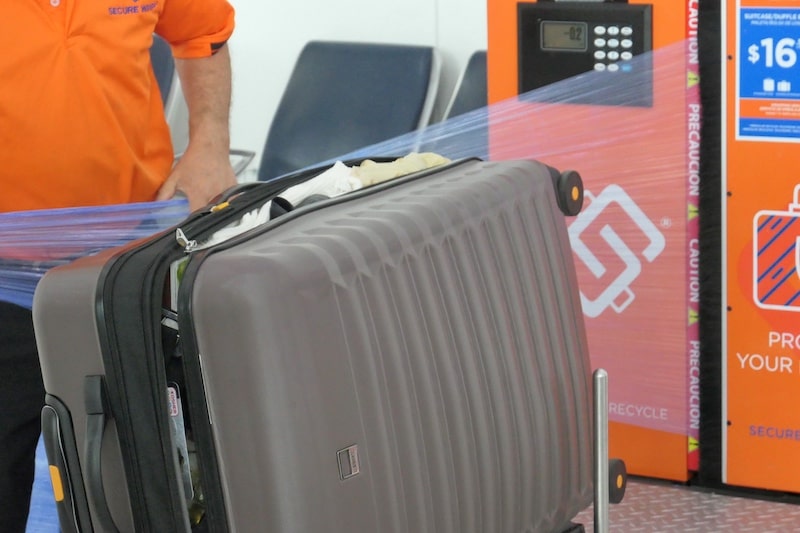
6. Deter pilfering
Shrink-wrap may discourage opportunity thefts when a thief needs to work quickly. Shrink-wrap is not easy to break into. Someone interested in rummaging through a bag on the chance there’s something worth stealing is unlikely to take the time to remove it. A thief would be more likely to choose easier targets.
7. Deter stashing of contraband
Shrink-wrap isn’t tamper-proof, but it is tamper-resistant and tamper-evident. If the wrap on a piece of luggage has been broken, the owner will know something’s amiss and can alert authorities before taking possession. Mind you, an accomplice has in all likelihood removed the stowed items before the bag appears on the luggage carousel in the arrivals hall. However, traces of their presence will likely remain. If in doubt, notify the authorities before touching the bag.
Disadvantages of shrink-wrapping luggage
- Shrink-wrapping costs money, adding to the cost of a trip.
- Arriving at the airport in time to use the service needs to be taken into consideration.
- Removing an item to take into the cabin of the aircraft is out of the question once the bag is wrapped.
- This amount of plastic is tough on the environment and users may not be familiar with recycling options at the point of removal.
- If a shrink-wrapped bag needs to be inspected during security screening or random checks, a screening agent will cut through the wrap.
Shrink-wrap luggage or not?
Are you opposed to the practice of wrapping a bag in reams of plastic? Can it (or should it) be avoided? Under what circumstances might you consider shrink-wrapping your luggage? What might tip the scales in favour of using a shrink-wrapping service? How can you minimize the adverse impact of wrapping your bag in plastic?
These seven tips might be useful:
1. Go carry on
Going carry on is unrealistic or undesirable for many people for a variety of reasons. For others, it’s a travel habit worth pursuing, and perfecting over time. Go carry on at least once, experience the benefits, and chances are you’ll want to avoid checking luggage whenever possible. Looking for motivation? Check out 15 Reasons to pack light and experience the benefits of carry-on travel. Looking for tips? See Top 20 tips on how to pack light.
2. Invest in good quality luggage
A well made bag made of durable materials with sturdy zippers is less likely to malfunction during transit. Interlocking zippers makes it easier to lock a bag or secure it with zip ties. Anti-theft bags with locking systems and puncture-resistant zippers are more difficult for thieves to penetrate. A lifetime warranty is a possible clue to good quality luggage. To learn more about these and other attributes, review 31 Features of a perfect carry-on bag: a buying guide to choosing the right luggage and Is the Osprey warranty any good? It’s so good, I’m now a customer for life.
3. Carry valuables with you
Don’t pack anything in checked luggage that you can’t afford to lose. Deter pilfering by not packing any money, jewellery, electronics, or alcohol in any luggage destined for the cargo hold.
Needless to say, you’ll need to adopt anti-theft strategies within the cabin of the plane. On-board theft happens. Thieves know that travellers carry valuables into the cabin and are adept at pinpointing lucrative targets and rummaging through bags and other belongings while passengers are sleeping or visiting the washroom.
4. Lock your bags
Make it as difficult as possible for thieves to quickly break into your luggage. Use locks or zip ties on checked luggage. Wrap duct tape or packing tape around a bag where the zippers meet. Yes, any bag might be child’s play to a determined thief, but most thieves need to work as quickly and surreptitiously as possible. The idea is to make your bag just not worth the trouble.
Lock carry-on bags stowed in the overhead lockers. In lieu of a lock, at the very least, position a bag with the zipper access points against the back wall of the locker or place the bag upside down to rest on the outer pockets and compartments.
5. Know what’s allowed in packed luggage
Avoid packing anything in your bag that might arouse suspicion during a scan. Agencies such as TSA (Transportation Security Administration) publish extensive lists of what is (and isn’t) acceptable in carry-on and checked luggage. Agents have the authority to access a locked bag or cut through shrink-wrap.
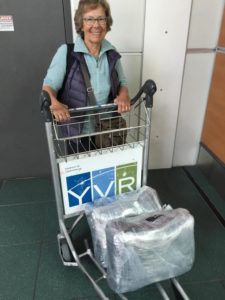 6. Suss out where thieves are active
6. Suss out where thieves are active
Find out if theft is prevalent in airports on your itinerary, especially those with long layovers. Search criteria such as “worst airports for theft” or “thefts from luggage at ___ (name of airport)” should produce up-to-date information. This type of pre-trip research helped friends decide to shrink-wrap their bags. Reports of pilfering in Johannesburg helped tip the scales in favour of wrapping their bags before leaving Vancouver.
7. Research shrink-wrapping services
If circumstances are such that you’ve chosen to shrink-wrap your bag(s), know in advance if the company offers a complimentary rewrapping service if the wrap is removed during screening. Some companies have agents available in the screening area for this purpose.
Take into consideration the environmental impact of using shrink-wrapping services. Only choose companies advertising a 100% recyclable product. Research shrink-wrap recycling options available at the place of removal. In all likelihood, it can be added to your recycling bin at home but this may not be the case elsewhere.
If you’re wrapping the bag yourself at a self-serve kiosk, ensure the wheels and handle are left unwrapped, or are otherwise accessible and available for use. Here’s a video of the process at a staffed shrink-wrapping station.
If you found this post helpful, please share it by choosing one or more social media buttons. What about you? Would you use a shrink-wrap service? Have you shrink-wrapped a bag in the past? Why? What was your experience? Please add your views in the comments. Thank you.
Care to pin it for later?

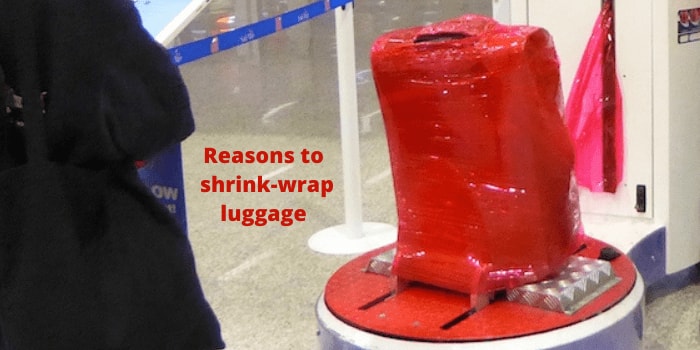
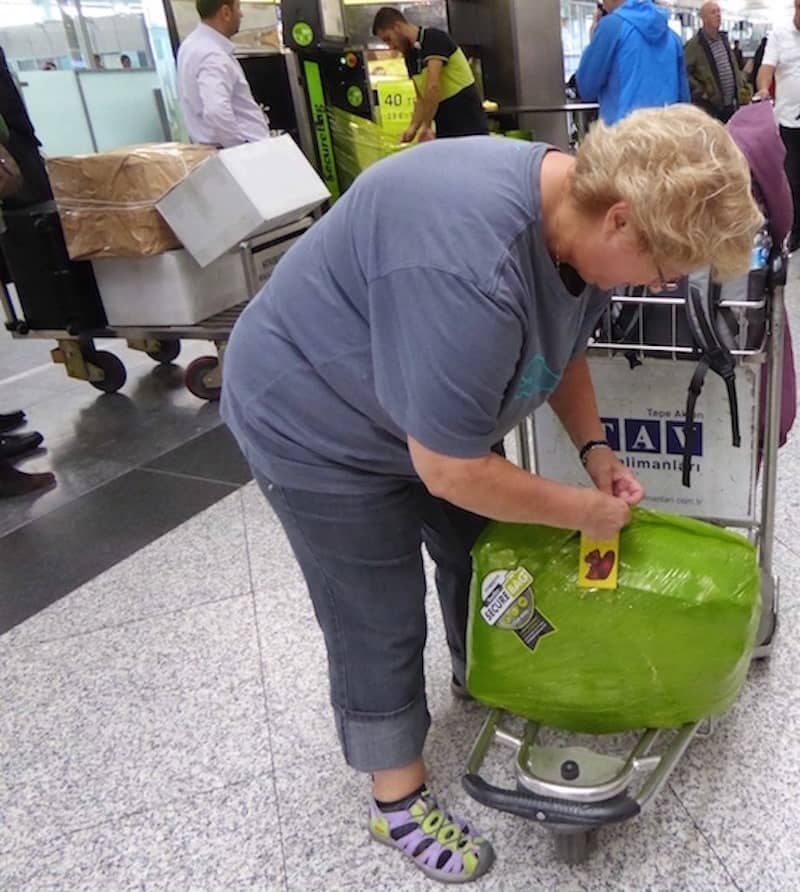
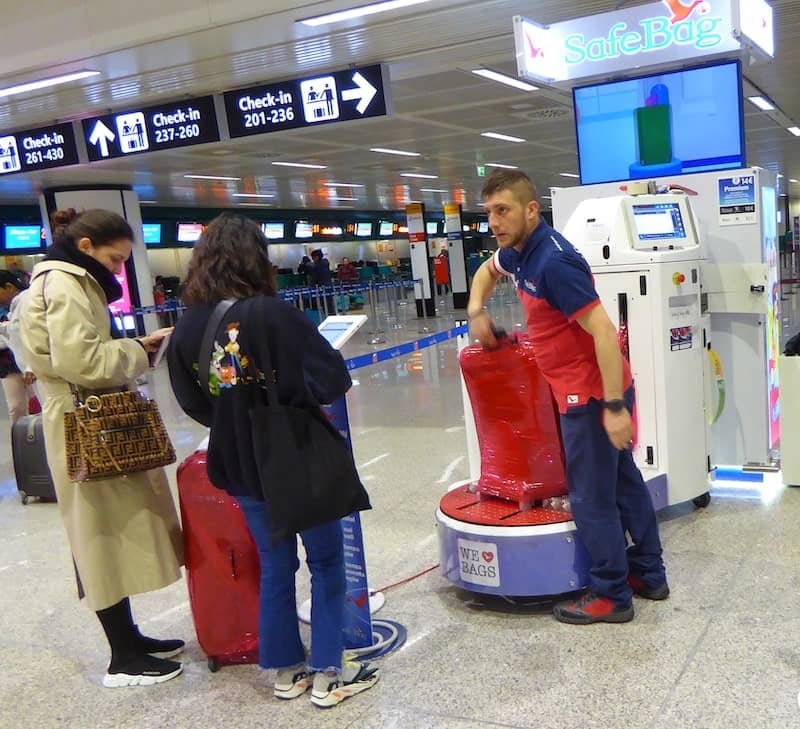
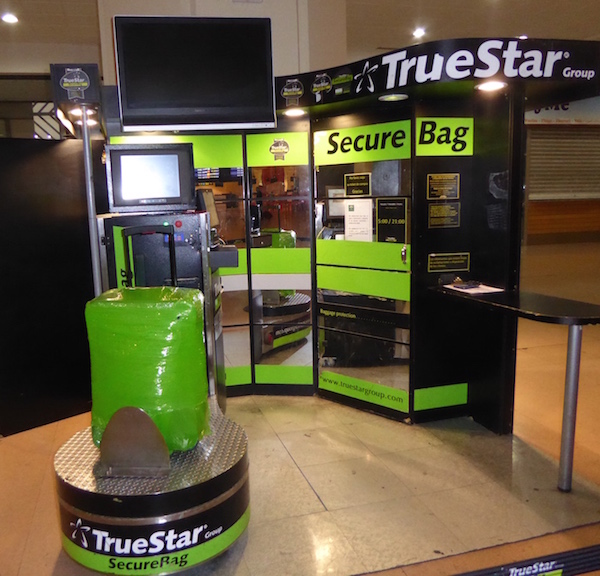
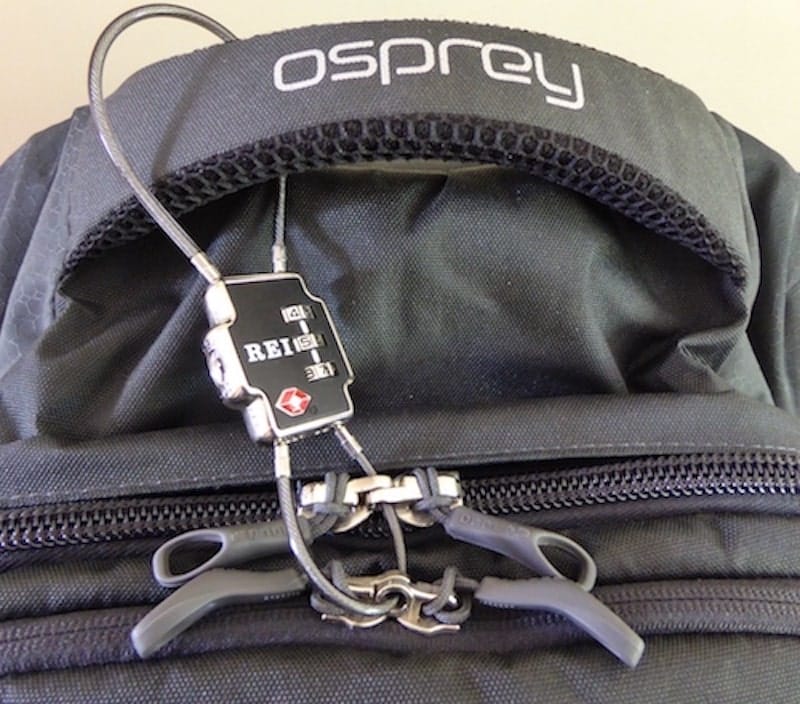
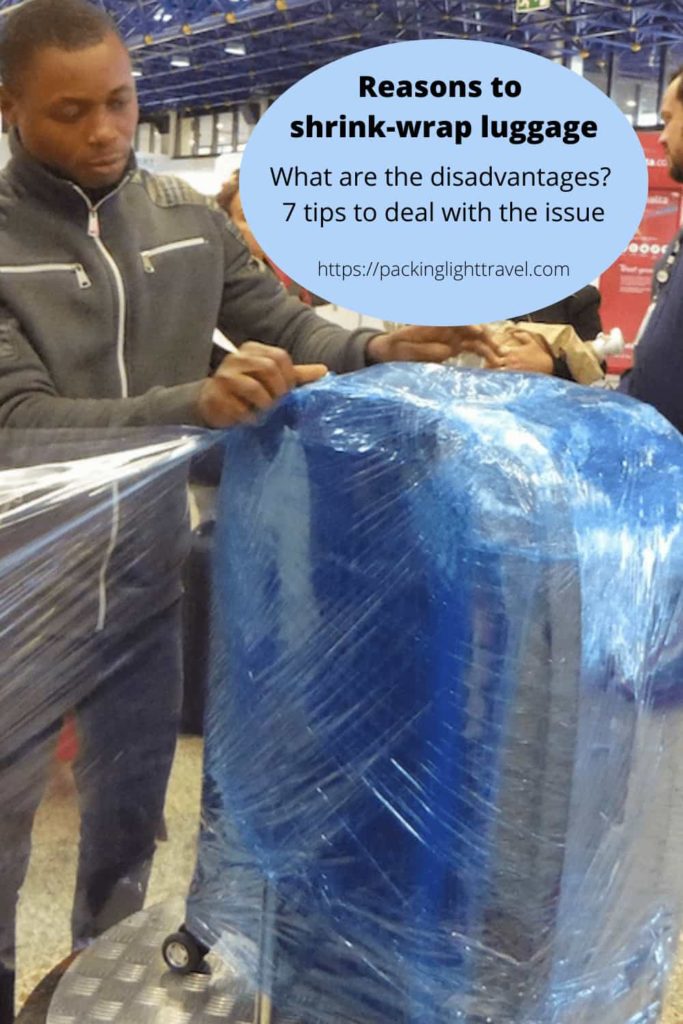




one reason NOT to use shrink wrap at usa airports – if your bag needs to be searched by TSA, you just wasted your money, because they will cut the wrap without any hesitation (not to mention the tsa guy will be upset that you made him work harder, to open your bag).
So interesting, I have never heard of or seen this done before! I like the idea of making 2 bags count only as one. Bringing luggage has turned way too expensive these days.
These are some good pros and cons to using shrink wrap services. Personally, I never use them as I’m working hard to reduce my environmental impact but also, I think a good quality lock is just as much, if not more protection than shrink wrap. I can definitely see the benefit to protecting your suitcase – mine has become rather bumped and bruised and is showing signs of wear and tear! Although I think that just adds to the story – I know which airports caused most of the damage! Great guide, thanks for sharing!
Interesting read. I’ve never thought of doing this before because of the cost, plus as you said at the end of the day it will just end up in a bin adding to the plastic problems.
I actually have always wondered why people do this at airports – now I know the benefits to it!
I have never considered shrink wrapping luggage before, so this has been so interesting to read about! Perhaps I will next time…
Amy Aed recently posted…A FIRST TIMERS’ GUIDE TO MANCHESTER
I’ll be honest, I’ve never shrinkwrapped my luggage before and never thought to because it just looks a tad environmentally unfriendly, but these are definitely really really great points and absolutely worth considering – especially if you’re travelling to and fro ‘iffy’ airports!
We have often thought about shrink wrapping our luggage to protect it during handling. And from water when we visited Caribbean islands where luggage often sits outside in the rain. Shrink wrapping two suitcases is an interesting way to save on baggage fees. The one time we did it was when our suitcase was damaged and we wanted to make sure it did not fall apart in transit. But I agree there are other ways to address some of the issues that drive shrink wrapping luggage.
Linda (LD Holland) recently posted…A Short Stop In Zurich
Great post!!! I’m going to visit Italy in December with my wife (if COVID does not spoil it!)
Right now I’ve showed her your tips. Thank you very much!!!